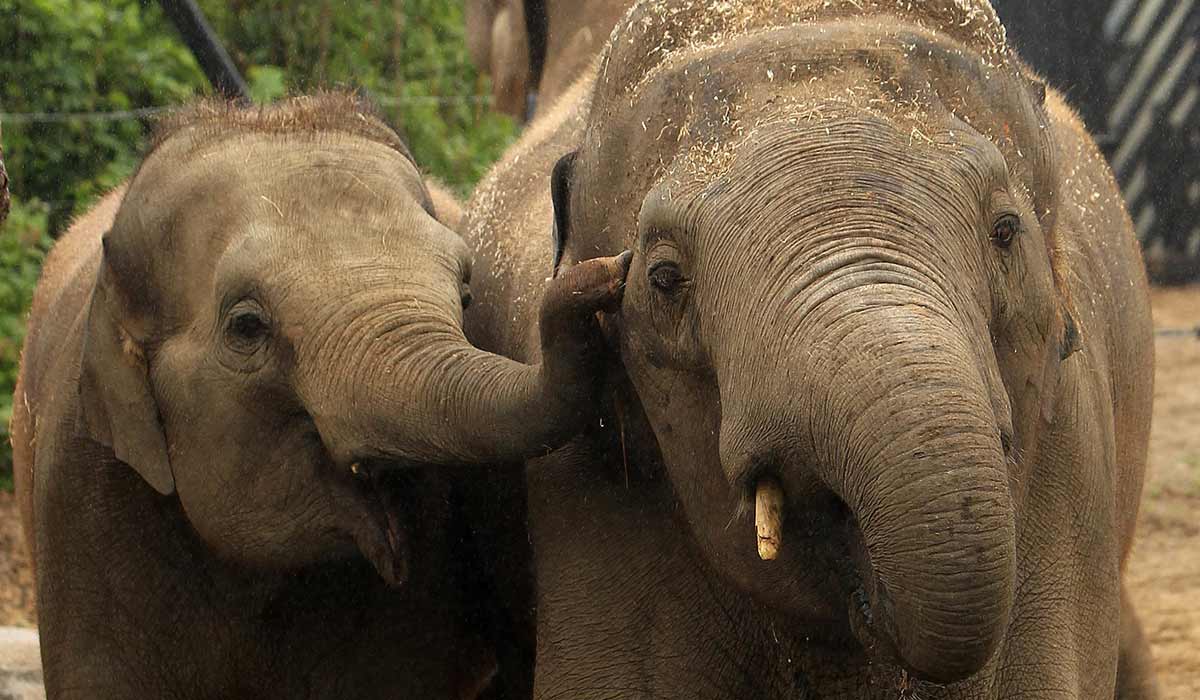Lifestyle
Spanish Tourist Sparks Outrage for Feeding Beer to Elephant

A Spanish tourist has ignited a significant backlash after being filmed pouring beer into the trunk of an elephant at the Ol Jogi Wildlife Reserve in Kenya. The incident, which quickly went viral, has drawn sharp criticism from wildlife conservationists who describe the act as reckless and disrespectful to both the animals and Kenya’s conservation efforts.
The elephant in question, known as Bupa, is a large bull elephant recognized for his damaged tusks. Rescued from a mass cull in Zimbabwe in 1989, Bupa has become a beloved figure at the reserve, serving as an ambassador for conservation. The sanctuary emphasized that it takes incidents like this “extremely seriously,” highlighting the risks posed to wildlife by such interactions.
In a separate video that has since been removed, the same tourist was seen feeding carrots to two elephants and hand-feeding rhinos. Dylan Habil from Ol Pejeta stated, “He has broken our rules; he was not supposed to touch the rhinos, they are not pets.” The public response has been overwhelmingly negative, with many calling for a lifetime ban from conservatories for the man.
Social media users expressed their disgust, with one comment stating, “Wtf is wrong with humans?” and another asserting, “People need to be put in cages so animals can roam freely.” The incident has reignited discussions about the responsibilities of tourists when interacting with wildlife.
Dr. Winnie Kiiru, a Kenyan biologist and elephant conservationist, expressed concern that such viral stunts can misrepresent wild animals to the public. “About 95% of elephants in Kenya are wild,” she explained, underscoring the importance of respecting their nature. “Social media posts that imply you can get close to elephants and feed them send the wrong message.”
This incident parallels a similar controversy earlier this year involving a Russian woman who shared footage of herself vaping with an orangutan at a zoo in Crimea. That incident also drew widespread condemnation, with critics labeling her actions as abusive.
As discussions about wildlife tourism continue, it is clear that education and awareness are crucial in preventing such irresponsible behavior in the future. The Ol Jogi Wildlife Reserve’s commitment to conservation remains strong, but incidents like these highlight the need for greater respect and understanding of the animals that attract tourists from around the globe.
-

 Top Stories3 months ago
Top Stories3 months agoTributes Surge for 9-Year-Old Leon Briody After Cancer Battle
-

 Entertainment4 months ago
Entertainment4 months agoAimee Osbourne Joins Family for Emotional Tribute to Ozzy
-

 Politics4 months ago
Politics4 months agoDanny Healy-Rae Considers Complaint After Altercation with Garda
-

 Top Stories4 months ago
Top Stories4 months agoIreland Enjoys Summer Heat as Hurricane Erin Approaches Atlantic
-

 World5 months ago
World5 months agoHawaii Commemorates 80 Years Since Hiroshima Bombing with Ceremony
-

 Top Stories3 months ago
Top Stories3 months agoNewcastle West Woman Patricia Foley Found Safe After Urgent Search
-

 Top Stories5 months ago
Top Stories5 months agoFianna Fáil TDs Urgently Consider Maire Geoghegan-Quinn for Presidency
-

 World5 months ago
World5 months agoCouple Convicted of Murdering Two-Year-Old Grandson in Wales
-

 World5 months ago
World5 months agoGaza Aid Distribution Tragedy: 20 Killed Amid Ongoing Violence
-

 World5 months ago
World5 months agoAristocrat Constance Marten and Partner Convicted of Infant Murder
-

 Top Stories4 months ago
Top Stories4 months agoClimbing Errigal: A Must-Do Summer Adventure in Donegal
-

 Top Stories4 months ago
Top Stories4 months agoHike Donegal’s Errigal Mountain NOW for Unforgettable Summer Views









